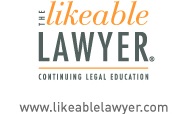
Basis of Influence 1: Leadership, Trust, and Automatic Influence
12/20/2016 9:30 AM - 11:30 AM Website
|
 |
Techniques of "automatic influence" are built into the fabric of what makes us human, and give the ability to persuade without the appearance of influence. Lawyers use and are influenced by them, sometimes without even realizing it. This course explores the factors that affect every attorney’s ability to lead and persuade, including the role of “perceived” trust, and what scholars have identified as the 9 Techniques of Automatic Influence.
These short courses build on sections from our highly regarded courses "The Trusted Lawyer" and "The Persuasive Lawyer." (The Basis of Influence Series covers additional new material, but there is some overlap and review.) Each short course stands alone, so you can can one or take them all!
Speaker: Brian Hammer
Course Content
| 60 minutes |
|
Qualities that Earn and Diminish Trust
At the heart of Aristotle s model of persuasion are relationship and trust. Lawyers explore a popular leadership model, discovering effective tools to build trust and influence with: clients, opposing lawyers, fact finders and co-workers. |
 |
| 60 minutes |
|
The 9 Techniques of Automatic Influence
The success of the "good cop bad cop" negotiation or interrogation strategy relies upon the contrast principle, one of the 9 techniques of unconscious influence explored in this section. Understanding these powerful principles gives lawyers both a sword and a shield towards improving results in negotiation and persuasion. |
|
|
|
|